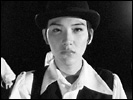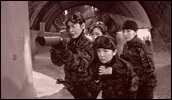Karaoke Terror
- Year
- 2003
- Original title
- Showa Kayo Daizenshu
- Japanese title
- 昭和歌謡大全集
- Alternative title
- The Complete Showa Era Songbook
- Director
- Cast
- Running time
- 112 mnutes
- Published
- 25 August 2005



by Nicholas Rucka
Stories of the battles between the young and old are nothing new, especially not as played out on the film screen. In fact, there could be an argument that recent Japanese films have been filled with the issue of the widening generational gap and the conflicts coming from such a gulf. It's no secret that Japan is dealing with the issues surrounding social dysfunction within society - academics and politicians, whose jobs are to analyze, surmise, and proselytize their findings, point towards the disbanding of the traditional Japanese family and the lack of traditional social outlets from which to find support. Others say it's the age-old conundrum of the 'kids these days' just not respecting their elders. Well whatever the reason might be, I got news for you pops, according to the hideously titled Karaoke Terror (a.k.a. The Complete Showa Era Song Book) it can go both ways; sometimes those adults just don't respect the youth of today.
Based on the novel by Ryu Murakami, Karaoke Terror is a pants-off, naughty little film about generation gap gone Grand Canyon sized. In the one corner, you have the five young 20-somethings who don't quite know how they became friends, but do know that they need each other and their bi-weekly karaoke sessions, complete with bondage outfits (!), for their soul soothing. In the other corner we have five middle-aged women - the dreaded obasans of Japan - aimless divorcees all named Midori. (According to the ojisan gun dealer in the movie, it's not the cockroaches that will be left after the apocalypse, it'll be the obasans!) They too live for karaoke and spend so much time together that they seem to room with each other, taking every meal together, talking about everything - but not really listening to each other. All is kosher until one of the Midoris, played by Shungiku Uchida of Visitor Q fame, is killed by one of the 20-something boys, Battle Royale's Masanobu Ando, who is appalled that as a strapping young lad he is turned down for a 'fuck' by an obasan! Isn't he what they dream about? Well, yes and no it turns out-- he just happened to hit on the wrong Midori!
For the Midoris this will not stand, although their friendship as a whole becomes stronger as a result of the first Midori's death, and they vow bloody revenge against the young punk who murdered their friend. But in Murakami and director Tetsuo Shinohara's world nothing is cut and dry; murder begets murder and with each killing the weapon of choice grows in size and absurdity.
What we have then, it is my supposition, is Ryu Murakami getting sick of the aforementioned academics and politicians who are trying to lay blame for the current Japanese societal dysfunction on a society that is incapable of participating in a dialog with one another on any level, cross-generational or not. To illustrate this fact, he takes a silly premise and plays it out to its most ridiculous extreme. Interestingly, the film doesn't work in a strictly logical narrative manner, but that's sort of the point. You can nitpick the use of deus ex machina in the film - and you'd be right - but in reality the humor in the film derives in large part from this conscious manipulation of the story - the absurdity of it all. The most obvious example is the use of the clairvoyant who helps the Midoris find their murderer and helps the young men find the Midoris to exact their revenge on.
One could argue that the spirit of later Monty Python is in full effect here. The humor in the film is dark, droll, and occasionally totally random; the violence is like an orchestra strike and almost always over the top; and the music is pretty damn good in that 'dasai kakkoi' retro manner (lame, but therefore cool). With this being said, it's a safe bet that if you don't like this sort of thing then you won't like this movie.
As for the technical aspects of the production, the film is shot on wide-screen 35mm with a clean and controlled manner with high production values. In fact, part of the humor of the film comes from the contradiction in production values and its midnight movie sensibilities. Unfortunately, the biggest drawback to Karaoke Terror is its long running time: there are moments that could have benefited from being more taut. Regrettably, this results in the occasionally imprecise and diluted dramatic or comedic moment which might prove too much for some audience members. Point in fact, part of my issue with the film is its reliance on a kind of bridge-span-like structure to its storytelling (something that looks like this: ^-^-^-^-^), with the action being the spikes and the dramatic exposition filling out the stretches in between. Having to wait so long between moments of comedy and action might work for a Takeshi Kitano film but unfortunately it proves to be a liability in this one. Which is a shame, because the film could have been a homerun if it had been made more economical.
Notwithstanding all of this, Karaoke Terror is a worthy filmgoing diversion, particularly for those who are sick of being lectured by what's wrong in society and, more importantly, would be amused by young men and middle-aged women shooting rockets at each other. I guess you'll have to count me in for that one.